NEWS BLOG
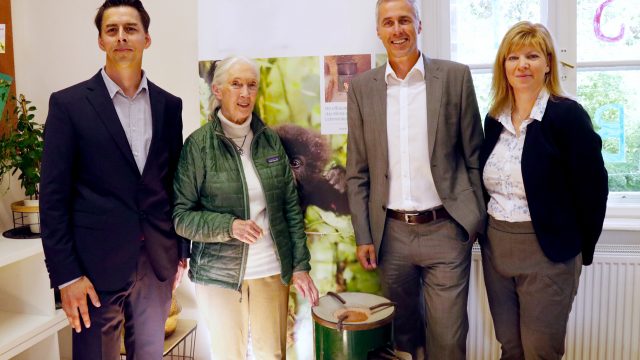
IMPRINT
LIKANO Project Development GmbHPfarrgasse 4 Top 82500 Baden Austria Telefon: +43 (0) 2252 931 810e-mail: office@likano.euWeb: www.likano.eu Gerichtsort: Baden, NiederösterreichGeschäftsführer: DI Michael NovoszadFirmenbuchnummer: FN 42 1445yFirmenbuchgericht: Wiener Neustadt UID: ATU68928967Aufsichtsbehörde: BH 2500 BadenMitglied der Wirtschaftskammer NiederösterreichUnternehmensgegenstand: Handel
STAKEHOLDER FEEDBACK
Likano Project Development GmbH is together with local partners developing a domestic fuel-efficient improved cookstove project in the Republic of Rwanda, called the Rwandan Improved Cookstove Project. The project is being developed under the VERRA Standards VCS (Voluntary Carbon Standard) and SD VISTA (Sustainable Development Verified Impact Standard) in order to obtain Voluntary Carbon Units (VCU). By distributing and installing our improved cookstoves to households in Rwanda, replacing the traditional three-stone fire, we aim to reduce the fuel consumption which will thereby reduce greenhouse gas emissions as well as indoor air pollution and time for wood collection. During a public comment period we welcome stakeholder feedback to further improve the design of the project. Feedback on the SD VISTA will be collected from 17 April 2023 to 17 May 2024. More project information can be found on VERRA homepage under the link: https://verra.org/open-for-public-comment/ and the VCS Project Site . Please provide your feedback through the Feedback Form: First Name Last Name E-Mail Details of your Feedback(required) Phone Number(required) District(required) Village(required) Country(required) Send Feedback Δ
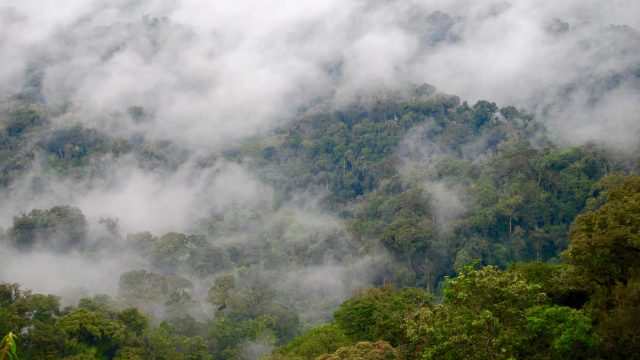
Nyungwe Rainforest
Almost hidden, you´ll find in the Southeastern corner of Rwanda another natural jewel, the Nyungwe Forest, a vast untouched tropical rainforest with a high, dense canopy. Nyungwe became a National Park in 2012, spreading over 870 km2, its almost 3.000 m high mountains, part of the Albertine Rift system, are the watershed of the two biggest rivers in Africa, the Congo and the Nile. The heart of Nyungwe Forest is like a scene from a fairy tale. Tall old mahoganies, ebonies and giant tree ferns tower above you, whilst orchids and other epiphytes cling to every branch. Brightly coloured birds flit around, butterflies are everywhere, and walking quietly you may even encounter larger forest residents, including a variety of primates for which Nyungwe National Park is renowned. Nyungwe Forest National Park includes the largest swathe of remaining montane forest in East or Central Africa. It harbours about 310 different bird species, hundreds of butterflies and orchids, and over 75 different species of mammals – including 13 primates (about a quarter of all Africa’s primates). The plant life is similarly diverse with 200 tree species of trees plus over 100 orchid species! The Likano team starts a new project in cooperation with the Wildlife Conservation Society (WCS) and the cooperative COPMONYA (“Cooperative de Poterie et Materiaux Ornamentaux de Nyamasheke), where around 15,000 efficient cook stoves were disseminated to households in very close vicinity to the forest. This measure decreases the pressure for tree cutting substantially, because replacing a 3-stone-fire by a cook stove reduces the amount of firewood for cooking. We will report more about this exciting project soon.
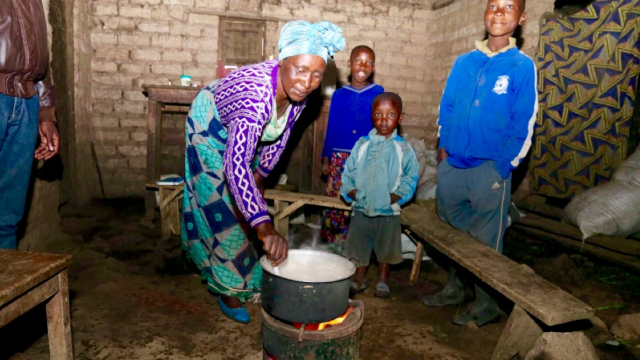
We visit Mukasine and her family in Kabatwa
Some month have now gone since the first stoves have been dissemiated in the region of Kabatwa. Before the visit, we were very excited , how the stoves have proofen its worth in praxis. After a longer offroad trip we reached the sector office of Kabatwa and went – together with our local partners – to the hut of Ancille Mukasine. She gave us a warm welcome and guides us inside to her new improved cook stove with the number 01481. They are just cooking. Ancille proudly tells us, how the stove has significantly ameliorated the life of her family. The smoking gases have fallen substantially: She has no irritated red eyes and irritated lounges any more. Now she spends 50 Rwandan Franc (apps. 5 Cent) for firewood per day – a sixth of what she had to spend when the family cooked on the traditional three-stone-fire. Very important is also the factor time. The cooking time is halved, she gains one full hour per day – that´s a lot, considering the circumstance that the people only can work for around 12 hours a day due to the lack of electric light in the huts. So, she has more time for agriculture and other basic activities. We are again overwhelmed how the pure numbers in the times of the project planning now mean for the real life of the families in Kabatwa. This successful project implementation strengthens us in our work for future challenges. When leaving, I´m shaking Ancille´s hand – as a project partner.
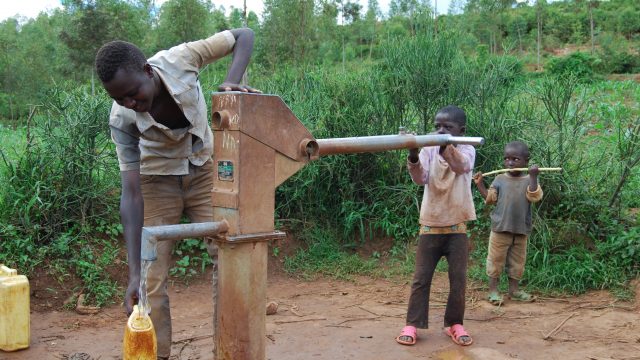
Borehole Project
Gatsibo is a largely rural district in Rwanda where people typically use wood fuel on inefficient three-stone fire to boil their drinking, cleaning and washing water. This process results in the release of greenhouse gas emissions from the burning of wood. This can be avoided if a technology is applied which does not require fuel (like wood or fossil) and supplies the clean water desired by households. The rehabilitation of boreholes helps to prevent carbon emissions through the provision of clean water by removing the need to boil the water to purify it. While tackling climate change caused by the combustion of unsustainably harvested biomass, the project also reduces pressure on woodlands and wildlife, and diminishes atmospheric pollutants inside people’s homes.
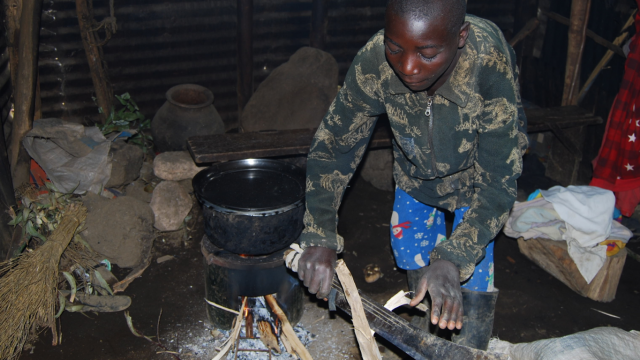
What makes a perfect stove?
Replacing an traditional 3-rock cook stove with an improved one is more challenging as it seems upon first look. What makes a perfect stove? Mainly three factors: Efficiency, durability and it must be easy to operate. A special design of the new stove leads the flames directly to the cooking pot – the insulation makes sure that the heat is stored for a long time. David Dufero´s family (picture above, beside his cooking hut) from Kabatwa Sector close to the Volcanoes Nationalpark only needs 1/3 of the firewood now. It is also very important, that the stove works for many years. The dissemination of thousands of stoves only makes sense if the local people have the certainty to use the stove for a long period of time. Nothing is more difficult to get back lost confidence because of low quality stoves. Countries where people still cook on open fire have different requirements for the stove, that´s because their staples are different. In Ethiopia for example, families eat Injera, a soured flatbread. You need a round metal plate for baking the dough, unlike in Rwanda where maize, beans and rice is cooked in a pot. The close contact with the local people before and during the project implementation bear fruits – everybody around the National Park loves the new stove. That not only shows up in the reduce firewood consumption but also a look in the happy faces.
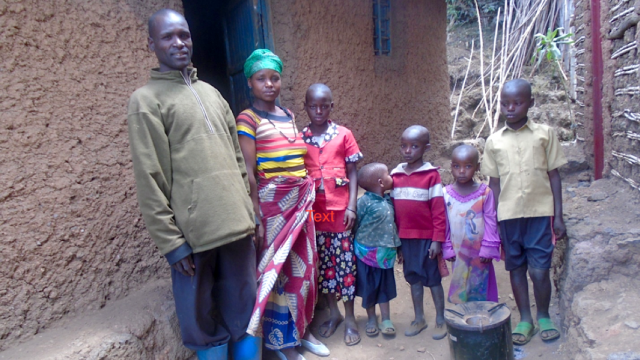
We love to cook efficiently!
“We have significantly less smoke in our kitchen!”, tells Florence Nyiramisiyoni from Burera excited. Together with her 3 kids the 25 year old live at the edge of the Virunga massif in a village called Rwankongi. A small mud-walled hut is their home. “I´m very happy to have the new stove here and use it every day for all meals I´m preparing. We now cook since one month and all our expectations have been exceeded. Surprising was the convenient handling and the robustness of the stove.“ Florence´s family (left) is one of the first, that received an efficient cook stove in the context of the Virunga Mountain Gorilla Project for the conservation of the gorilla´s habitat. Florence Uwamahore (center) owns also one of the first stoves and lives with her kids in the same village. “How do you benefit from your new stove?”, asks Faustin, our assistant on the ground, who is in tight contact with the locals. “We use to cook on the traditional 3-stone-fire and needed a lot of firewood. With the efficient stove we can reduce this amount by 2/3, that´s an incredible improvement of our livability. The hours we spend for the time consuming collecting of firewood can now be used for other activities.”, says Florence. That is also confirmed by N. mahoro Philomene (right) from Cyanika Sector. “My kids and me now have much more time for school and agriculture. It´s unbelievable, that such a small stove can have such a big effect, but on the other hand it´s seems to be crystal clear – cooking is the most important topic in Rwanda.”, she smiles.
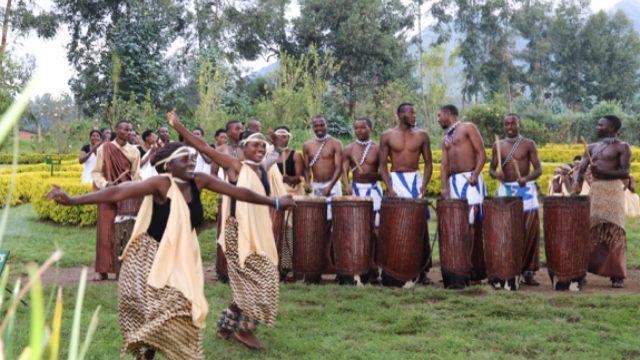
A new life for former poachers
Edwin Sabuhoro, a former National Park employee, founded Rwanda Eco-Tours in 2005, a jointly-operated organization. His motivation: To provide a sustainable liveli-hood that goes beyond preserving nature for the surrounding villages too. For all too often, poverty forces poachers and hunters into the forest. Everything collected in the forest can be exchanged in the village for food.For the project of the „Iby’Iwacu Cultural Village“ Sabuhoro gained several hundred former poachers and hunters as employees. In this traditional village, traditional dance performances with regional music take place. This creates work and income. Tourists stop off on their way gorilla trekking and contribute to the preservation of the environment and of culture. The village belongs to the community and is organized and managed as a „cultural village“ by the village community.The project offers the former poachers and hunters a range of training opportunities, resources and alternative incomes. In the meantime, some have farm animals and forge their own plans to promote the local economy. Many of them now work as porters or guides and accompany tourists to their trips for watching gorillas or golden monkeys.
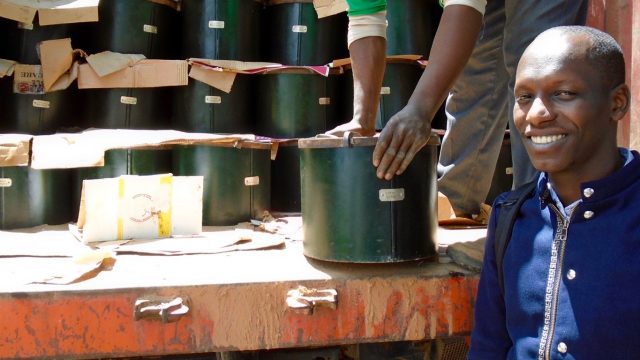
Nearby
To enable continuous project support locally in Rwanda, an office has been rented out from our project partners IGCP in Musanze. Musanze is located in a district with the same name in the Northern Province, just a few kilometers from the National Park. Our office does not lie on the border with the National Park, but it is within walking distance of the rainforest. This is the main starting point for gorilla trekking. Faustin Ngirabakunzi is one of employees in Musanze: „It is a real pleasure for me to work for this unique project. My former responsibilities for IGCP meant I was often on the road in the National Park area, helping with the collection of data. To be able to help my fellow Rwandans to achieve a sustainable improvement to their daily lives and at the same time to pro- tect our sensitive ecosystem, the home of the mountain gorillas, makes me very proud.“
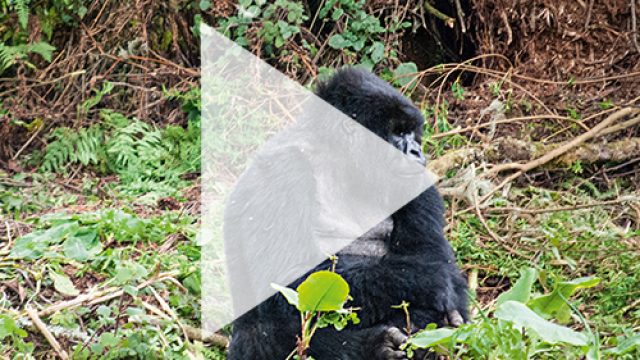
MOUNTAIN GORILLA TREKKING
Like the chimpanzees and the orangutans, the mountain gorilla belongs to the hominids. This specie is strongly threatened with extinction; there are only around 880 mountain gorillas left on the planet. (more…)
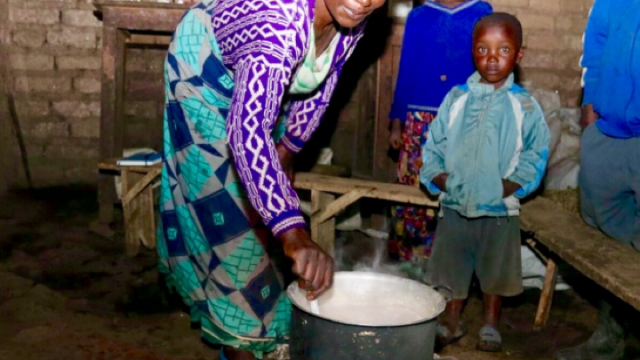
LIKANO PROJECTS
The Virunga Mountain Gorilla Project The energy-efficient stove reduces the demand of firewood. That means that families in Rwanda need less firewood from the surrounding forests, which in return helps preserve the habitat of endangered animals like the Virunga Mountain Gorilla. (more…)

OUR PROJECTS
The Virunga Mountain Gorilla Project The energy-efficient stove reduces the demand of firewood. That means that families in Rwanda need less firewood from the surrounding forests, which in return helps preserve the habitat of endangered animals like the Virunga Mountain Gorilla. (more…)
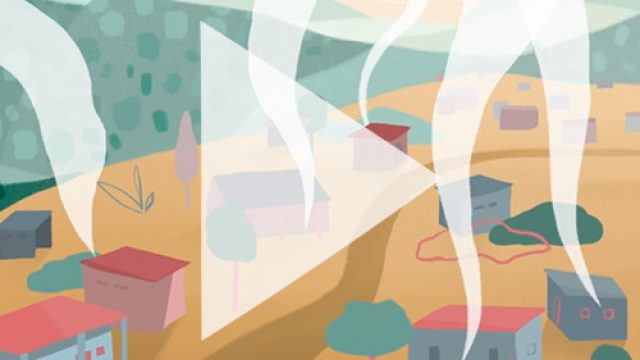
ABOUT LIKANO
Climate change is one of the most urgent challenges of our times and can already be witnessed on a global stage. It comes with weather extremes and causes dramatic changes in our ecosystems. (more…)
